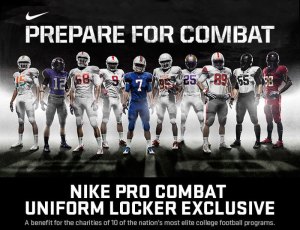By: Claire Levin
When I think of masculinity, the first characteristics to pop into my head are power, aggression, and dominance. These themes have been reinforced time and time again through media outlets and socialization in our culture. In fact, violent behavior is routinely gendered male (Katz 261). Men are taught to believe that in order to be a “real” man they must be physically strong and in control, using their bodies as instruments of power and dominance. Advertising essential dictates gender identities in our culture. Media outlets are constantly reasserting what it means, or should mean, to be masculine and feminine(Katz 262). With this definition of manliness comes a very evident theme of violence . Some examples are of aggressive males threatening the targeted consumer into purchasing a product, or ads that promise to enhance power and violence. This specific type of advertising can be found in ESPN Magazine, Sports Illustrated, Rolling Stone, and Maxim to name a few (Katz 263). These trends of masculinity transcend just advertising. They are reinforced throughout our every day lives. The Jim Rome Show, for instance, is a popular sports talk show that has grown popular for violent and misogynistic content (Nylund 174).
American sports are riddled with militarization especially in regards to professional football. The american sports industry is strongly tied to militarization, patriotism, and nationalism. When you look around any stadium throughout the country you will find patriotic iconography. The use of military symbolism in sports is said to enhance the masculine appeal (Katz 262). Sports are supposed to be an apolitical facet of our lives. Instead, they are just a platform for the idolization of the american hero, the soldier.
The National Football League (NFL) has completely ingrained military behavior into game time practice. On specific days of the year, they take time to honor our armed forces in promotional videos, moments of silence, and tributes to the military. Even during the NFL Draft, time is take out of the program to recognize military service (The NFL and USAA Honor the U.S. Military).
Even the sport itself has militant aspects. Comedian, George Carlin, highlights these military that run throughout football in his sketch Football vs Baseball. While contrasting the two sports, Carlin touches on the violent jargon used in the sport such as tackling, hitting, and sudden death. In the last moments of his sketch he says, “In football the object is for the quarterback, also known as the field general, to be on target with his aerial assault, riddling the defense by hitting his receivers with deadly accuracy in spite of the blitz, even if he has to use the shotgun… he marches his troops into enemy territory… with a sustained ground attack that punches holes in the forward wall of the enemy’s defensive line.” This connecting shows how closely related the sport of football is with going into battle.
Athletes are soldiers. Or at least that’s what american society seemingly wants us to think. Nike is a producer of athletic apparel in the United States and is known for being the world’s leading innovator in athletic footwear, apparel, equipment and accessories. Their mission is “To bring inspiration and innovation to every athlete in the world” (Nike). They too are guilty of the militarization of sports. In a recent promotional campaign, Nike launched a line of collegiate football uniforms with the tag line “Prepare For Combat.” This campaign directly links football players to soldiers, claiming that this specific line is the padding to a football player just as armor is to a soldier.
In a 2011 article in The Huffington Post, William Astore comments on the relationship between the military and sports in his article, “The Militarization of Sports — And the Sportiness of Military Service.” This article highlights on another aspect that has yet to be discussed, sportiness in the military. He describes ads in which soldiers are shown lifting weights and climbing mountains with a voiceover promoting toughness and teamwork. “There’s strong. Then there’s army strong” is a tagline promoting fighting for your country and exerting the earlier stated masculine qualities. What is ignored is actual portrayal of military activity such as drills, shooting, and combat. “We’ve created a dangerous dynamic in this country: one in which sporting events are exploited to sell military service for some while providing cheap grace for all, even as military service is sold as providing the thrill of victory while elevating our troops to the status of “heroes,” says Astore.
http://http://www.huffingtonpost.com/william-astore/the-militarization-of-sports_b_912004.html
All in all the ties between violence and masculinity, masculinity and sports, and sports and the military are now tightly engrained in American culture.
Works Cited
Astore, William. “The Militarization of Sports — And the Sportiness of Military Service.” The Huffington Post. TheHuffingtonPost.com, 28 July 2011. Web. 24 Oct. 2013. <http://www.huffingtonpost.com/william-astore/the-militarization-of-sports_b_912004.html>.
Katz, Jackson. “Advertising and the Construction of Violent White Masculinity: From BMWs to Bud Light.” Advertising and Consumer Culture (n.d.): 261-69. Print.
“The NFL and USAA Honor the U.S. Military 0.” NFL.com. N.p., n.d. Web. 24 Oct. 2013. <http://www.nfl.com/videos/nfl-videos/0ap2000000091260/The-NFL-and-USAA-honor-the-U-S-military>.
Nike. Prepare For Combat. Online image.
“Nike’s Mission Statement.” Nike Mission Statement. N.p., n.d. Web. 24 Oct. 2013. <http://help-en-us.nike.com/app/answers/detail/a_id/113/p/3897>.
Nylund, David. “When in Rome: Heterosexism, Homophobia, and Sports Talk Radio.”Journal of Sport & Social Issues 28.2 (2004): 171-83. Print.
RedSoxNation92. “George Carlin: Football vs Baseball.” Online video clip. YouTube. YouTube, 21 Feb. 2012. Web. 24 Oct. 2013.

